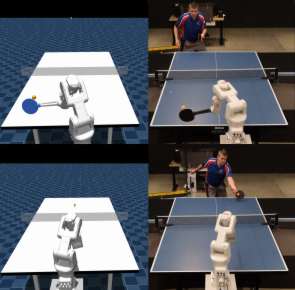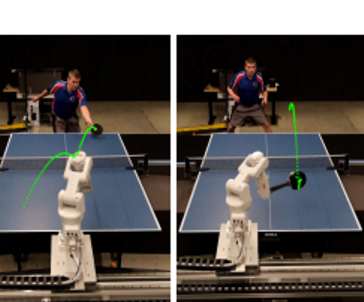| DeepMind Plays Table Tennis |
| Written by Lucy Black | |||
| Sunday, 11 August 2024 | |||
|
Not content with winning at Go and Chess, competing successfully in the Math Olympiad and making advances in Quantum Chemistry, DNA folding and weather forecasting, DeepMind has turned its hand, or rather its robotic arm, to table tennis. Robot table tennis isn't new. Its over a decade since we reported on two humanoid robots, developed in China where table tennis is an important sport, play a convincing match. That project, at Zhejiang University, was part of a government-sponsored push to build workable robots for home and industry and table tennis, which is largely a matter of visual tracking the ball combined with agility of movement, was seen as a useful test bed. Google DeepMind has a similar motivation for its interest in table tennis which is seen as a step towards achieving human-level speed and performance on a real world task. The project combines robotics and computer vision with convolutional neural networks and reinforcement learning and has achieved a lot in a short time frame - albeit with a large team. The paper now on arxiv.org has 27 authors. The table tennis robot is a robot arm with six degrees of freedom that has a 3D-printed paddle handle and a paddle coated with a rubber surface. It is mounted on top of two gantries to enable motion both towards and away from the table and side to side across the table. Initial training consisted of simulated table tennis games with a huge investment in terms of attention to detailed points of both materials and ballistics.
After this a human coach gave the robot agent the opportunity to practice returning a diverse range of shots using both forehand and backhand. The demonstration video includes returning a lot with a convincing smash and coping with net shots. Did you spot the missing ability? As a one-armed robot it can't initiate a point by tossing the ball in the air and then hitting it over the net. Instead it has to let its human opponent make all the serves. The robot's performance was assessed by playing 29 games against human players, ranging in ability from beginner to tournament level, of which the robot won 13. Specifically, the robot won all matches against beginners but lost all matches against the most advanced players. It won over half of matches against intermediate players, giving the robot success rate of 45% which the researchers concluded demonstrates "solidly amateur human-level performance". Highlights from the matches are captured in this long video. I particularly liked the reaction from the tenth player who on losing the point comments to the robotic agent as if it was a human. The concluding remarks of the paper authored by the DeepMind researchers put this success at table tennis into its wider context: This is the first robot agent capable of playing a sport with More InformationAchieving Human Level Competitive Robot Table Tennis Related ArticlesCan DeepMind's Alpha Code Outperform Human Coders? Can Google DeepMind Win At AI? DeepMind Solves Quantum Chemistry Why AlphaGo Changes Everything To be informed about new articles on I Programmer, sign up for our weekly newsletter, subscribe to the RSS feed and follow us on Twitter, Facebook or Linkedin.
Comments
or email your comment to: comments@i-programmer.info |
|||
| Last Updated ( Sunday, 11 August 2024 ) |




